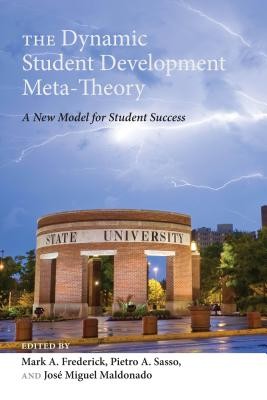
- We will send in 10–14 business days.
- Publisher: Peter Lang Inc., International Academic Publishers
- ISBN-10: 1433134179
- ISBN-13: 9781433134173
- Format: 15.2 x 22.4 x 2.5 cm, softcover
- Language: English
- SAVE -10% with code: EXTRA
The Dynamic Student Development Meta-Theory (e-book) (used book) | bookbook.eu
Reviews
Description
The Dynamic Student Development Metatheodel (DSDM) is a meta-theory based on empirically based inferences drawn from a national survey entitled the University Learning Outcomes Assessment (UniLOA). The UniLOA's current dataset consists of over 500,000 college student participants and has supported impressive findings that allow for the reconceptualization of long-held cultural artifacts and assumptions regarding the way students grow, learn, and develop (GLD) and how decision makers within postsecondary education have selected to engage the domains of student development measured by the UniLOA. This book champions a model of student success. The DSDM was developed from common factors identified in multiple theories and models within the areas of human and student development as well as empirically based theories and models of education. By first defining complementary elements within the theories and models then establishing accurate operational definitions, the planning and engagement of appropriate services, supports, interventions, and programs (SSIPs) and the active assessment of their outcomes can lead to a more effective response to current challenges faced by higher educators. As a metamodel, the DSDM reconceptualizes student success within higher education that is disruptive to the current accepted paradigm of student learning and engagement. This book is intended for faculty and staff interested in critical debate about issues in higher education and for deliberation by graduate students in college administration programs.
EXTRA 10 % discount with code: EXTRA
The promotion ends in 10d.23:06:20
The discount code is valid when purchasing from 10 €. Discounts do not stack.
- Publisher: Peter Lang Inc., International Academic Publishers
- ISBN-10: 1433134179
- ISBN-13: 9781433134173
- Format: 15.2 x 22.4 x 2.5 cm, softcover
- Language: English English
The Dynamic Student Development Metatheodel (DSDM) is a meta-theory based on empirically based inferences drawn from a national survey entitled the University Learning Outcomes Assessment (UniLOA). The UniLOA's current dataset consists of over 500,000 college student participants and has supported impressive findings that allow for the reconceptualization of long-held cultural artifacts and assumptions regarding the way students grow, learn, and develop (GLD) and how decision makers within postsecondary education have selected to engage the domains of student development measured by the UniLOA. This book champions a model of student success. The DSDM was developed from common factors identified in multiple theories and models within the areas of human and student development as well as empirically based theories and models of education. By first defining complementary elements within the theories and models then establishing accurate operational definitions, the planning and engagement of appropriate services, supports, interventions, and programs (SSIPs) and the active assessment of their outcomes can lead to a more effective response to current challenges faced by higher educators. As a metamodel, the DSDM reconceptualizes student success within higher education that is disruptive to the current accepted paradigm of student learning and engagement. This book is intended for faculty and staff interested in critical debate about issues in higher education and for deliberation by graduate students in college administration programs.


Reviews